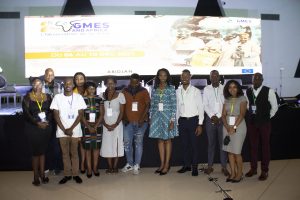
SASSCAL participated at the GMES and Africa 2nd continental forum in Abidjan, which took place from 6 – 10 December 2021. The Forum addressed on how Earth Observation can power Environmental Sustainability and Socio-economic growth in Africa. This theme is reflective of the overarching mandate of the Programme, including the utilization of EO services and applications to foster environmental and long-term natural resource management for human development.
The 2nd continental forum of the first phase of GMES & Africa began with opening statements from several high-level delegates, including Professor Sarah Anyang Agbor, AUC Commissioner for Education, Science, Technology, and Innovation, Professor Affian Kouadio, Vice President of University Felix Houphouet-Boigny, Professor Adama Diawara, Côte d’Ivoire’s Minister for High Education and Scientific Research, and Jean Luc Assi, Minister of Environment and Sustainable Development representing the Ivorian Prime Minister, His Excellency Patrick Achi. The dignitaries jointly welcomed all participants to this milestone occasion of the GMES and Africa 2nd Continental Forum.
During the opening ceremony, in his speech, Professor Affian commended all twelve consortia on a job well done and their accomplishments in the first phase of GMES and Africa programme objectives. The Professor recognized and gave a token of appreciation to Dr Tidianne Ouattara and Dr Mahaman Ouedraogo for their hard work and achievement in the implementation of the GMES and Africa project. In addition, he praised the support of both financial and technical partners involved in the programme.
Following the opening remarks, Dr Tidiane Outtara and Dr Mahman Ouedraogo highlighted the objectives and expectations of the forum. Dr Ouedraogo rationalized the imperative continuation of the second phase of the GMES and Africa programme with the successful outcomes during the first phase of implementation. Dr Outtara further shared the achievements of the project’s first phase in the implementation of data infrastructures, recognizing the 12 Environmental stations and 48 operators. He also pointed out the ways they have leveraged to raise awareness regarding outreach initiatives using traditional media, social media platforms, and the internet.
Professor Sarah Anyang Agbor from the AUC hailed the GMES and Africa programme as an important initiative to improve the continent’s sustainability. She also acknowledged the twelve consortia who effectively implemented the project across all African regions. Furthermore, Professor Agbor addressed the ways of ensuring the continuation of the GMES and Africa after 2024 emphasizing on integrating the GMES and Africa programme into other AUC initiatives. Furthermore, she noted that Africans need to take ownership of the programme driving the vision of sustainable development in Africa.
The first session of the 2nd GMES and Africa Forum started with a keynote address by SASSCAL’s Executive Director, Dr Jane Olwoch and followed by a high-level panel discussion with the title “Earth observation: Powering Sustainable Environment and Socio-Economic Growth in Africa”. Dr Olwoch remarked on the importance of EO to protect and restore our environment for the future generation. The use of earth observation in research such as human settlement mapping, natural resources and environment, water resource management, climate change as well as disaster assessment and mitigation has helped to investigate the future in a sustainable way. She further highlighted how EO data has been leveraged to develop solutions to prevent and provide relief for communities during natural disasters. Dr Olwoch acknowledged, Professor Agbor’s remark on AU’s Agenda 2063 and added on how the EO programme is aligned with Agenda 2063 to achieve the Africa we want in so many aspirations and targets together with the United Nations Sustainable Development Goals. The importance of the adoption and implementation of EO data as well as space-based technologies for disasters were further highlighted. Through GMES and Africa, there has been an increased leverage of EO data to provide services for the benefit of all Africans.
The forum featured testimonials of various GMES and Africa sponsorship beneficiaries. Furthermore, over 40 master and PhD students have been funded through GMES and Africa. At the end of the session, SASSCAL students among other beneficiaries explained how their postgraduate research influences and improves the African environmental, social and economic situation. The beneficiaries were also awarded with certificates of Ambassadors of GMES & AFRICA to commend their hard work and dedication throughout the programme.




